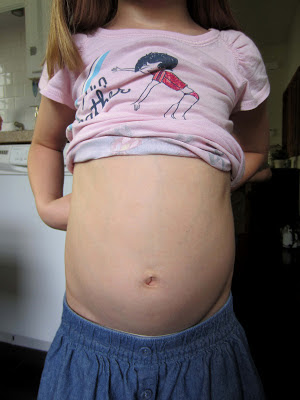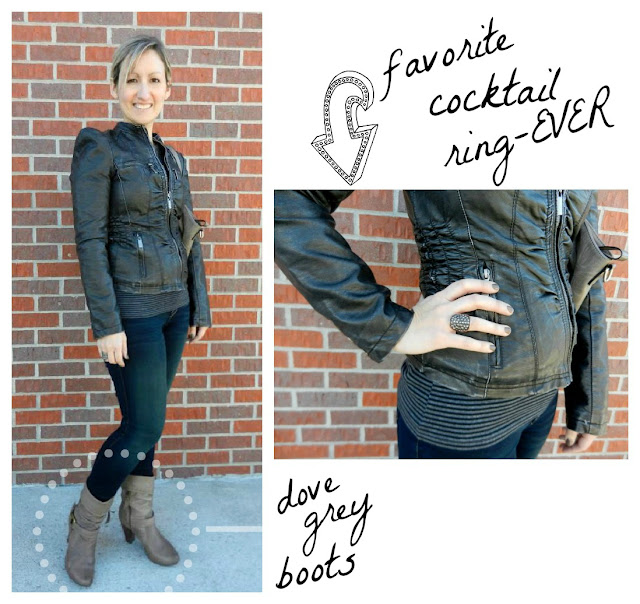Beautiful
When I posted my first tummy shots, my almost seven-year-old was troubled. I told her I put it there so people would know it was okay if they had wrinkly tummies. She thought about that and decided she wanted her's photographed and shared so people with smooth tummies would know that was okay too.
She's the one I think of most when I think about my tummy's wrinkly skin. How do I explain to her that we are beautiful the way we are, but I don't like how my stomach looks now? I've always told her you don't have to look like a Disney princess to be beautiful - that that's just one kind of beauty. When she first started to be aware of the princess stereotype, she'd tell me she didn't like a woman who had short spiky hair. This bothered me because I don't feel like womanhood is defined by feminine accessories or even mannerisms. A woman is a woman whether she wears a dress or cargo shorts. So I told her the princesses are "fancy" and it's fine to like being fancy, but people are beautiful all the time, even when they're not very fancy.
What is the "truethiest truth" I can tell her about beauty? That it comes from inside? It's what radiates out of us that makes people love the sight of us or dread it. This is absolutely true but we don't often take those factors into consideration when we evaluate ourselves. We strip ourselves of our personal qualities and harshly critique the physical attributes. "Nose is too big, right eyelid droops..." This is objectification. Forgetting we are living, breathing people makes us cold. This video, created by Dove, demonstrates the danger of discounting our personality's effect on our looks.
On the other hand, the physical appearance is real and makes up part of the equation. I was tempted to ditch media's lie that only models are beautiful, but replace it with the opposite lie: That everyone and everything is beautiful. While I believe you can find something beautiful about anyone, I also realize there are ugly parts. I questioned if I'd just been trained to think that by society. Then I heard about infants who are presented photos of an attractive person and an unattractive person. They spend the large majority of their time looking at the attractive face. So we are naturally drawn to beauty. It's not just in our heads. While we're brainwashed to think only a tiny percentage of humans qualify as beautiful, it might be brainwashing as well to teach my kids that there is no difference. That everyone is equally beautiful.
It's a great relief to come to this middle ground of truth. I don't have to sell my kids the idea that the opposite of beautiful is beautiful. I won't be pressuring them to love everything about themselves. Accept it, yes. Like it like their favorite flavor of ice cream? No. And that's okay. Cadence has a birthmark on her hand that she wishes wasn't there. I can tell her how I love it and that when I only can see her hand, I know it's her because no one else's hand could fool me, but she may still wish it were "normal." And that's okay. I'll encourage her to focus on the parts of her she genuinely likes and spend 99.9% of her time thinking about those things.
I think that's how happiness happens. The person with an artificial limb doesn't have to like it like they did their real one. They don't have to tell the world, "I'm so glad I've got an artificial limb. I wouldn't trade it for my real one any day." That's ridiculous. But if they can accept it and be grateful for the good in it, they can thrive. This is what I want for my kids and for me. I have things I'd change if a fairy godmother lent me her magic wand, but if she never shows up, life will still be grand. Saggy stomach and all.




This is beautiful, Kendra. I've often that one of the toughest things about having kids (besides picking just the right name for them to carry with them for the rest of their lives) must probably be teaching them how to like themselves and others for whom they are.
ReplyDeleteI hope that Cadence is growing up in a world that is more able to accept diverse beauty than ever before, but as even the Dove video for all of it's good points proves, there is still a standard of beauty we all fight against (it struck me that the women in that video are almost exclusively thin, white and youngish).
I just (finally) read "Reviving Ophelia" and was intrigued by Mary Pipher's suggestion that adolescent girls have a harder time being valued as people rather than pretty objects because the world is so big and impersonal now that all we have to judge each other on is looks. There is rarely a personal connection that helps us see past the superficial.
Good luck as you keep trying to instill such deep concepts in your little ones. It's a shame more kids don't have such wise, thoughtful and truly beautiful mothers to guide them.
-lauren
Lauren - I started Reviving Ophelia and pooped out. I should press on! And thank you for your encouragement...means so much!
DeleteIt seems like there's two parts: Love and acceptance for self, and love and acceptance for others. They happen in different ways. We can accept who we are, while also changing or accenting our looks how we want (straightening or dying hair, wearing makeup, etc.). We can accept who others are, but we can't (and shouldn't) change them, so it seems we need to see the beauty in all types of people and respect them as people, not as beautiful objects.
ReplyDeleteI struggle how to teach my kids this when I still seem to be figuring it out myself. It complicates things when the same company making "love yourself" ads (Dove) is also behind the "women are objects" ads (Axe). I don't know if they still are the same company, but they were when we discussed this very thing in college. It just shows me I shouldn't accept much of what media has to offer--good or bad. The Bible (and biblical-inspired resources) really are the best places to learn love and acceptance and understanding of beauty.
Sorry to add all of that. Thank you for sharing your journey in this and thought process for yourself and for helping Cadence understand. Keep it up! You're doing a great job :)
Your thoughts are ALWAYS welcome! Thanks for continuing the conversation to the difference between changing ourselves verses others. I too wish I had this figured out and could pass on something neat and tidy!
DeleteThis post holds a lot of truth. I have often thought of these very topics, as I also have a daughter (she'll be seven in two weeks). I have to be careful about what I say about my body and the mindset I have when I workout and eat. There have been a handful of times in the last couple of years when she has come to me and asked if she was fat. My Little Miss is a tiny, petite thing. Not an ounce of fat there, and it broke my heart that she could even think that way about herself.
ReplyDeleteAll of you have some very valid and thoughtful concerns, as many moms these days.
ReplyDeleteBut to continue the conversation about it, my 60-yr.-plus wisdom tells me that the easiest way to have your children not focus on their looks is to encourage them to keep their focus on others and the Lord.
Sometimes we become so absorbed in developing good self-esteem in our kids, we fail to see that what they really lack is a genuine compassion, a real empathy for others.
This can happen only as families strive to find a mission project that takes them out of their comfort zone and gives them opportunities to see people from all walks of life.
When we come to where we can truly value the pretty and the ugly in those around us for who they are inside (as Jesus does), it won't matter so much what any of us look like on the outside. We can see them through Jesus' eyes--including the person we see in the mirror.
Beauty is such a tricky subject, especially as a mom of a little girl. Explaining the value of inner beauty and the idea of make up is difficult. For me, there are three main points: one, let's lower our standards. In the media only a 10 on a scale from 1 to 10 is considered beautiful, while a 9, 8 or 7 can be still very, very beautiful. Even, let's say a 3. I don't thing everything is beautiful and there also most be room for the 1s and 2s. But just because it's not the worlds greatest sunset, it still can be incredible and amazing. Two, don't accept the "official" standards without questioning them. We accept that everybody has a different taste regarding food, music, pictures, why not regarding body and face? Just because the media (and toy industry) presents us with a stereotype it doesn't mean that we can't like something else. And three beauty doesn't equal value. Somebody can be ugly AND amazing, and even the 1st sunset you watched with your partner may not been the prettiest, but I bet it's the one which has the most value for you.
ReplyDeleteI do want my daughter to like beauty - a beautiful picture, great music, even a pretty dress, it can enrich life. But it doesn't define its value nor the one of my daughter.
This is beautiful.
ReplyDelete